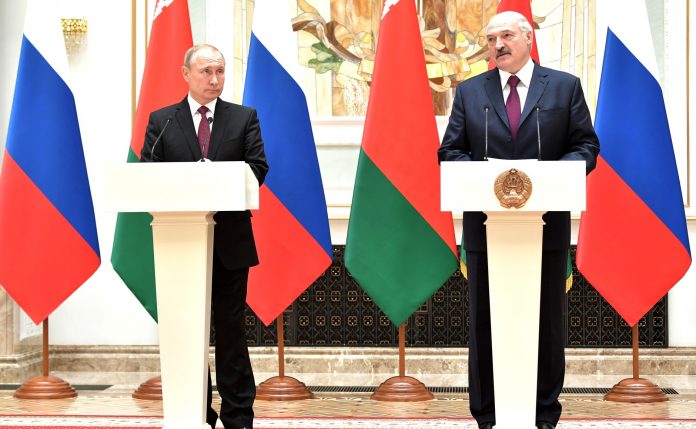Belarusian President Alexander Lukashenko is fighting his probably most important political battle. Although he is expected to easily win presidential election scheduled for August 9, as most opposition candidates have been arrested, he is faced with serious pressure from both, Russia and the West.
Belarus, former Soviet republic which Western mainstream media call “the last dictatorship in Europe”, is officially Russia’s closest ally in Europe. In reality, the two countries have a long history of disputes, especially when it comes to oil and gas prices. For the past two decades, the Kremlin has been buying Lukashenko’s loyalty by subsidizing Belarusian economy and providing cheap natural gas and crude oil to the Eastern European country. In January this year, Russia halted oil supplies to refineries in Belarus after Moscow and Minsk failed to renegotiate oil prices for 2021. Ever since, Belarus started diversifying its energy import. In April, Minsk bought 80,000 tonnes of Arab Light crude oil from Saudi Arabia. Previously, Belarus received its first batch of Norwegian oil, and in May the former Soviet republic reportedly purchased the U.S. cruse as well. Even though the prices and transport of oil from these countries to Belarus are much more expensive than oil import from neighboring Russia, Belarusian President demonstrated that he was ready to pay more so that he does not have to kneel before Putin and ask for cheap oil.
Besides oil, the two countries cannot agree on the price of natural gas. Lukashenko recently accused Moscow of selling natural gas to Europe at the price under $70 per thousand cubic meters, while Belarus, Russia’s ally, has to pay $127. The novel coronavirus crisis has caused major drop in energy prices, but Russia still refuses to reduce charges of natural gas to Belarus. Russia’s energy giant Gazprom voiced its readiness to negotiate a price on natural gas only after Minsk settles its $165 million debt for the delivered gas. Belarus, on the other hand, denies that Minsk has debts to Gazprom. In any case, the energy issues are far from resolved, and without cheap gas and oil Belarusian economy could be in a big trouble. Its GDP already went down by 1.8 percent, which could be a consequence of the global coronavirus crisis. Since the world is facing radical transformation of energy trade, it is unlikely that Russia will keep providing cheap natural gas and crude to its ally, unless it gets significant concessions from Minsk.
Twenty years ago, the two countries formed a supranational organization called the Russia Belarus Union State. Ever since, this entity has been existing mostly on paper, as Moscow and Minsk cannot agree on crucial issues such as common currency, parliament, government, customs, currency, judicial and tax systems. There are speculations that Russia is demanding from Belarus closer integration into Russia Belarus Union State an exchange of cheap energy. Lukashenko is quite aware that his country would lose monetary sovereignty if the common currency would be printed in Moscow. On the other hand, if he decides to turn westward, he will have to implement neoliberal “shock therapy” and reform Belarusian economy according to the IMF demands. Given the fact that his position is getting weaker due to economic situation and foreign-backed protests all over Belarus, he will likely have to make some painful compromises.
Belarusian leader recently accused Russia and Poland of interfering in the upcoming presidential election, saying that there are “horrific fakes” being spread about him, some in Russian anonymous social media accounts. It is worth mentioning that a form of psychological warfare is taking place in Belarus. Anti-Lukashenko activists started spreading propaganda mantras how the President is supported only by three percent of the Belarusian voters. Such a scenario is virtually impossible, as he is firmly supported by the vast majority of pensioners, who make more than 20 percent of the population, as well as rural population, and to a certain extent people employed at the public sector. Still, the opposition, backed by the West, is trying to create an illusion that Lukashenko has lost legitimacy.
There are speculations that certain opposition candidates, such as Viktor Babariko, are backed by Russia. Babariko, former banker who spent 20 years working for the local unit of Russia’s Gazprombank, was seen as the most serious threat for Alexander Lukashenko. He was arrested on June 18 after he was accused of siphoning $430 million out of Belarus in money-laundering schemes. His arrest sparked protests all over the country, but since the security apparatus, controlled by one of Lukashenko’s sons, is still loyal to the current president, at this point there is no danger for Lukashenko to be overthrown.
Last month, Belarusian police arrested a popular vlogger Syarhey Tsikhanouski and that way prevented him from running the presidential election. Nikolai Statkevich, who was a presidential candidate in the 2010 election, was also jailed, and last week Yuri Gubarevich, the head of the For Freedom movement, was sentenced to 15 days in prison for “running a mass event”. It remains to be seen if Babariko will be allowed to run against Lukashenko, or if the election commission will void his candidacy as he is allegedly involved in corruption schemes.
In any case, Lukashenko is expected to easily win the election and he also seems to be ready for any potential riots. He recently went to Moscow to attend the Victory Day Parade, and even thought it was expected that he would meet Russian President Vladimir Putin, he left for Minsk right after parade. Still, bridges have not been burned down, as the two leaders met again as they took part in a ceremony of unveiling the Monument to the Soviet Soldier in the Russian town of Rzhev. Until the election Lukashenko is expected to try to get Russia’s support and guarantees that the Kremlin will not abandon him in the same way it “betrayed” former Ukrainian President Viktor Yanukovich, who was overthrown in 2014 after the West-backed violent protests.
Unlike Yanukovich, Lukashenko, who has been in power for the past 26 years, seems to be determined to fight. However, in order to stay in power, he will likely have to make certain concessions either to Russia, or to the West. Or maybe to both.
The views and opinions expressed in this article are those of the author.

The author is a Serbian freelance journalist. He writes for several publications such as CGTN, Geopolitical Monitor, Global Security Review, International Policy Digest and Global Comment. Nikola also regularly contributes for YouTube geopolitical channel KJ Vids. He covers mostly Russia, Belarus and Ukraine.


